#enmesharra
Text
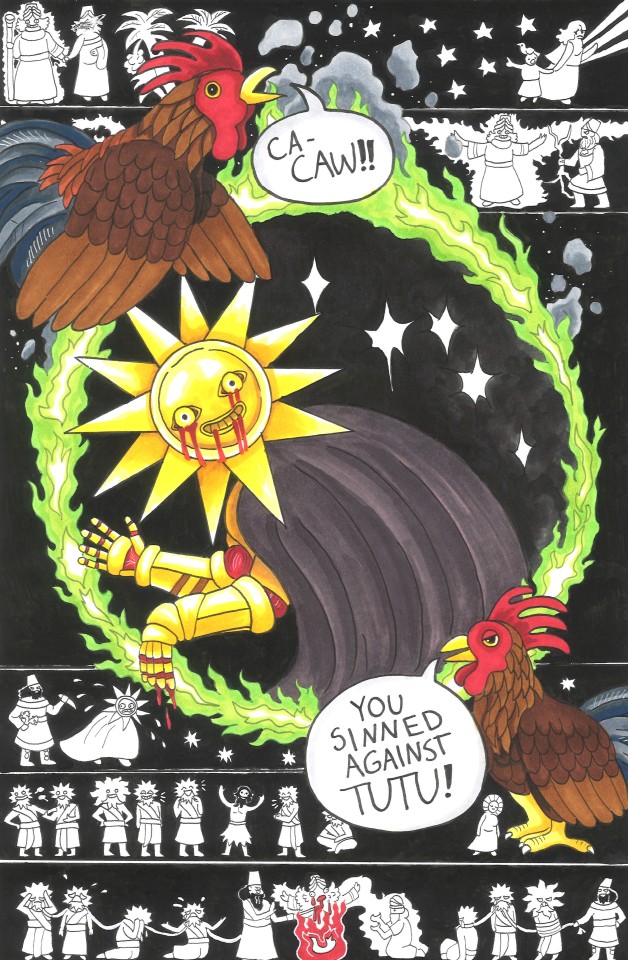
Final day: Enmesharra The Calamity King
Enmesharra was among the ancestors of Enlil, an older generation of gods, and appears in myths commonly as an antagonistic figure. In one he contends with Marduk (With Nergal as a jailer) in another with Enlil. In some of these he is killed (put to the sword or burned) but in one, his children the Sebbitti (2and to bottom panel) are beheaded in his place, and he escapes. I like the idea that he represents a sort of “primordial chaos” that contends with Enlil’s order.
He is described as having a “spleandor”/radiance which is taken from him and given to Shamash in one of his executions. (Bottom panel)
A lot of my characterization of him comes from a game of DND that me and some of my friends played, where he was a flayed man in a gold suit as a result of his execution.
47 notes
·
View notes
Photo

Enmesharra, Enlil’s evil uncle.
14 notes
·
View notes
Text
Just realized that Enlil and Namzitara is probably the closest there is to a bronze age counterpart of Pratchett's Small Gods.
A certain Namzitara, who is introduced as a menial worker in Enlil's temple complex in Nippur, encounters Enlil in the form of raven (something pretty unique in Mesopotamian context - gods do not really shapeshift there), recognizes him and presents his esoteric knowledge of his background, specifically his past struggle with his uncle Enmesharra (sic; this was most likely obscure, arcane knowledge, since primordial deities hardly factored into everyday religion); Enlil rewards him for his piety, the end.
18 notes
·
View notes
Text
Mesopotamian Mythological Figures to Use for Dislyte Ocs:
Anu, Enki/Ea, Enlil, Gilgamesh, Marduk, Tiamat, Ishtar/Inanna, Ereshkigal, Nanna/Sin, Enlil, Ningal, Ninhursag, Mamu, Hadad, Nabu, Assur, Simut, Nergal, Ninsianna, Ninurta, Dumuzid, Gula, Nimintabba, Nindara, Ninegal, Ninkarrak, Bau, Ishkur, Itsaran, Nanaya, Nanshe, Ninmug, Ninpumuna, Lulal, Iiaba, Ishmekarab, Irnina, Isimud, Ishum, Kabta, Kanisurra, Ki, Kus, Kusu, Lagamar, Laguda, Mami, Mammitum, Mandanu, Manzat, Martu, Misharu, Nanibgal, Ninsar, Lugaldukuga, Nammu, Lahar, Las, Dumuzi-abzu, Duttur, Emesh, Enbilulu, Ninmena, Shuishaga, Ninkilim, Ningirima, Ningishzida, Ningublaga, Tiamat, Alammus, Ama-arhus, Uttu, Wer, Ningal, Ningikuga, Tutu, Uras, Ningirida, Ninhegal, Ninimma, Erra, Erragal, Ezina, Gareus, Gazbaba, Geshtinanna, Gibil, Gugalanna, Ninazu, Ninlil, Ninshubur, Nisaba, Zababa, Alala, Belili, Anshar, Kishar, Duri, Dari, Enki, Ninki, Tashmetu, Urkitum, Usur-amassu, Enmesharra, Gunura, Gatumdug, Haya, Hegir, Hendursaga, Humhum, idiurugu, Ninigizibara, Lumma, Ninkasi, Ninkurra, Ninmada, Ninmarki, Bitu, Bizilla, Damu, Dingirma, Amasagnudi, Amashilama, Antu, Asarluhi, Ashgi, Aya, Bel-Sarbi, Belet-Seri, Bilgames, Enkimdu, Enlilazi, Ninsianna, Ninsikila, Ninyu, Nirah, Numushda, Nungal, Nunusdug, Nusku, Pabilsag, Paniginarra, Ninisina, Nintinugga, Lisin (brother is ashgi), Lugala'abba, Lugalbanda, Lugal-irra and Meslamta-ea, Sadarnunna, Sarpanit, Sarrahitu, Serua, Shala, Shara, Subula, Shullat and Hanish, Ennugi, Enten, Shulpa'e, Shui-utula, Shuzianna, Sirsir, Siduri, Silili, Sumugan, Tadmustum, Allani, Asratum, Belet-Šuḫnir and Belet-Terraban,
Note: Keep in mind that this list may not be accurate and/or may be missing some mythological figures because I put down what I knew and did the bare minimum of google searching.
#Dislyte#Dislyte oc#Dislyte oc's#Mythological figures for Dislyte oc's#Mesopotamian Gods#Mesopotamian Mythology#Mesopotamian Dieties
18 notes
·
View notes
Text
Enmešarra the Splendour
I’m a humble amateur student of ancient middle eastern (Sumerian, Hittie, Ugaritic, Syrian etc.) mythology and history. I like to draw my impressions of deities based upon the texts I read, especially those that do not have any surviving depictions and mostly those who are very obscure.
As such I have been loving to death the An Anum God list (and you may look through it yourself though you might want to consult an online source for it such as the one found at http://oracc.museum.upenn.edu. Sadly there is no completely easily available online treatment of the An Anum and thus it may be a bit hard to get into. In essence it is a God list cataloguing many of the thousands of deities on record in ancient Assyria and Mesopotamia as a whole, consisting of a total of 7 tablets.
Another great source for obscurity is the text K252, which I have been going over for some time, which is an Assyrian Temple and Altar list, showcasing many obscure deities, or even foreign deities granted an altar in Assyria, one of the most surprising appearance among them being the Zoroastrian Ahura Mazda, listed in Col. IX of K252 “As-sa-ra-Ma-za-áš“
As for my name, it is derived from Enmešarra “The Splendour”, Uncle or Ancestor of Enlil who attempted to acquire kingship and who was the father of seven sons who, from my lay perspective, may be identical with the Sebitti, or Seven, that are known to ravage the land alongside Nergal in the Myth of Erra and Ishum.
In the appropriate text called “Enmešarra’s Defeat”, there is the following evocative passage where Enmešarra is told of the doom that is to befall him for rebellion at the hands of Marduk, that made me adopt the name:
"When Enmešarra heard this "He cried "Alas" and his heart burnt. "He opened his mouth and spoke a word, " "Bēl is terrible that I, a god, should not live; "His judgements are terrible that my fledglings should not live."
"Nergal opened his mouth "Addressing a word to Enmešarra, the Splendour, "From the beginning, "From the very beginning, "This has been your answer, Enmešarra."
1 note
·
View note
Text
The Marriage of Nergal and Ereshkigal
Anu made his voice heard and spake, he addressed his words to Kakka,
"Kadda, I shall send you to Kurnugi.You must speak thus to Ereshkigal,Saying, 'It is impossible for you to come up.In your year you cannot come up to see usAnd it is impossible for us to go down.In our months we cannot go down to see you.Let your messenger comeAnd take from the table, let him accept a present for you.I shall give something to him to present to you.'" Kakka went down the long
stairway of heaven
.When he reached the gate of Ereshkigal, he said,
"Gatekeeper, open the gate to me!""Kakka, come in, and may the gate bless you."He let the god Kakka in through the first gate,He let the god Kakka in through the second gate,He let the god Kakka in through the thrid gate,He let the god Kakka in through the fourth gate,He let the god Kakka in through the fifth gate,He let the god Kakka in through the sixth gate,He let the god Kakka in through the seventh gate.
He entered into her spacious courtyard,He knelt down and kissed the ground in front of her.He straightened up, stood and addressed her,
"Anu your father sent meTo say, 'It is impossible for you to go up;In your year you cannot go up to see us,And it is impossible for us to go down;In our month we cannot go down to see you.Let your messenger comeAnd take from the table, let him accept a present for you.I shall give something to him to present to you,"'
Ereshkigal made her voice heard and spake, she addressed her words to Kakka."O messenger of Anu our father, you who have come to us,May peace be with Anu, Ellil, and Ea, the great gods.May peace be with Nammu and Nash, the pure Goddesses.May peace be with the husband of the Lady of Heaven.May peace be with Ninurta, champion in the land.
" Kakka made his voice heard and spake, he addressed his words to Ereshkigal,"Peace is indeed with Anu, Ellil, and Ea, the great gods.Peace is indeed with Nammu and Nash the pure.Peace is indeed with the husband of the Lady of Heaven.Peace is indeed with Ninurta, champion in the land."Kakka made his voice heard and spake, he addressed his words to Ereshkigal,"[ ] may be well with you."
Ereshkigal made her voice heard and spake, she addressed her words to her vizier Namtar,"O Namtar my vizier, I shall send youto the heaven of our father Anu.Namtar, go up the long stairway of heaven.Take from the table and accept a present for me.Whatever Anu gives to you, you must present to me."
(about 26 lines missing)
(Ea addresses Nergal)"
[ ][ ] path [ ]
The gods are kneeling together before him.
The great gods, the lords of destiny.
For it is he who controls the rites, controls the rites of [ ]
The gods who dwell within Erkalla.Why do you not kneel before him?
I keep winking at you,But you pretend no to realize,And..."
(6 lines missing)
(Nergal addresses Ea- apparently expressing a wish to visit Ereshkigal)
"[ ] I will rise to my feet[ ] you said.[ ] will double it." When Ea heard this he said to himself,"[ ]" Then Ea made his voice heard and spake, he addressed his words to Nergal."My son, you shall go on the journey you want to make,... grasp a sword in your hand.Go down to the forest of mesu trees.Cut down mesu trees, tiaru trees, and juniper!Break off kanaktu trees and simberru trees." When Nergal heard this, he took an axe up in his hand,Drew the sword from his belt,Went down to the forest of mesu trees,Cut down mesu trees, tiaru trees, and juniper,Broke off kanaktu trees and simberru trees,[ ] he made a throne for far-sighted Ea.He painted it with [ ] as a substitute for silver,Painted it with yellow paste and red paste as a substitute for gold,Painted it with blue glaze as a substitute for lapis lazuli.The work was finished, the chair complete. Then he (Ea) called out and laid down instructions for him,"My son, about the journey which you wnat to make: from the moment you arrive,Follow whatever instructions I give you.
From the moment they bring a chair to you,
Do not go to it, do not sit upon it.When the baker brings you bread, do not go to it, do not eat the bread.When the butcher brings you meat, do not go to it, do not eat the meat.When the brewer brings you beer, do not go to it, do not drink the beer.When they bring you a foot bath, do not go to it, do not wash your feet.When she (Ereshkigal) has been to the bathAnd dressed herself in a fine robe,Alowing your to glimpse her body...You must not do that which men and women do." Nergal set his face toward Kurnugi,To the dark house, dwelling of Erkalla's god,To the house which those who enter cannot leave,On the road where travelling is one way only,To the house where those who enter are deprived of light,Where dust is their food, clay thier bread.They are clothed, like birds, with feathers.They see no light, the dwell in darkness.They moan like doves. The gatekeeper opened his mouth and addressed his words to Nergal,"I must take back a report about the god standing at the door."The gatekeeper entered an addressed his words to Ereshkigal,"May lady, a [ ] has come to see us.[ ] will identify him." Ereshkigal made her voice heard and spake to Namtar,"[ ]" (Namtar replies)"Let me identify him,Let me ... him at the outer gate.Let me bring back to my lord a description of him."Namtar went and looked at Erra in the shadow of the door.Namtar's face went as
livid
as
cut tamarisk
.His lips grew dark as the rim of a kuninu vessle.Namtar went and addressed his lady,"My lady, when you sent me to your father,When I entered the courtyard of AnuAll the gods were kneeling, humbled before him,All the gods of the land were kneeling humbled before him.The gods rose to their feet in my presence.Now 'they' (Nergal) have gone down to Kurnugi." Ereshkigal made her voice heard and spake, she addressed her words to Namtar,"My dear Namtar, you should not seek Ellil power,Nor should you you desire to do heroic deeds.What, come up and sit on the throne of the royal dais?You, perform the judgments of the broad Earth?Should I go up to the heaven of Anu my father?Should I eat the bread of the Anunnaki?Should I drink the water of the Anunnaki?Go and bring the god into my presence!" Namtar went and let in 'the Gods', Erra.He let Nergal in through the first, the gate of Nedu.He let Nergal in through the second, the gate of Enkishar.He let Nergal in through the third, the gate of Endashurimma.He let Nergal in through the fourth, the gate of Enuralla.He let Nergal in through the fifth, the gate of Endukuga.He let Nergal in through the sixth, the gate of Endushuba.He let Nergal in through the seventh, the gate of Ennugigi. He came into the broad courtyard,And he knelt down, kissed the ground in front of her.He straightened up, stood and sddressed her,"Anu your father sent me to see you,Saying, 'Sit down on that throne,Judge the cases of the great gods,The great gods who live within Erkalla!'" As soon as they brought him to a throneHe did not go to it, and did not sit on it.When the baker brought him bread, he did not go to it, and did not eat the bread.When the butcher brought him mean, he did not go to it, and did not eat the meat.When the brewer brought him beer, he did not go to it, and did not drink the beer.When they brought him a footbath, he did not go to it, and did not wash his feet.When she went to the bath,And dressed herself in a fine robe,And allowed him to catch a glimpse of her body,He reisisted his heart's desire to do what men and women do. (about 13 lines missing)Nergal [ ]She went to the bathAnd dressed in a fine robe,and allowed him to catch a glimpse of her body.He gave in to his heart's desire to do what men and women do.The two embraced each otherAnd went passionately to bed.They lay there, queen Ereshkigal and Erra, for a first day and a second day.They lay there, queen Ereshkigal and Erra, for a third day and a fourth day.They lay there, queen Ereshkigal and Erra, for a fifth day and a sixth day. When the seventh day arrived,Nergal, without [ ]Took away after him [ ]"let me go, and my sister [ ]Do not make tremble [ ]Let me go now, and I will return to Kurnugi later." Her mouth turned dark with rage [ ] Nergal went and made his voice heard and spake.He addressed his speech to the gatekeeper,"Ereshkigal your lady sent me,Saying, 'I am sending you to the heaven of Anu our father'So let me be allowed out! The message [ ]." Nergal came up along the long
stairway of heaven
.When he arrived at the gate of Anu, Ellil, and ea,Anu, Ellil, and Ea saw him and said,"The son of Ishtar has come back to us,She (Ereshkigal) will search for him and [ ].Ea his father must sprinkle him with spring water, and bareheaded,Blinking and cringing let him sit in the assembly of the gods." Ereshkigal [ ]To the bath [ ]Her body [ ]She called out [ ]"The chair [ ]Sprinkle the room with the water of [ ]Sprinkle the room with the water of [ ]Sprinkle the room with the water of [ ]The [ ] of the two daughters of Lamashtu and Enmesharra,Sprinkle with the waters of [ ].The messenger of Any our father who came to see usShall eat our bread and drink our water." Namtar made his voice heard and spake,Addressed his words to Ereshkigal his lady,"The messenger of Anu our father who came to see us-Before daylight he disappeared!" Ereshkigal cried aloud, grievously,Fell from the throne to the ground,Then straightened up from the ground.Her tears flowed down her cheeks."Erre, the lover of my delight-I did not have enough delight with him before he left!Erra, the love of my delight-I did not have enough delight with him before he left." Namtar made his voice heard and spake, addressed his words to Ereshkigal,"Send me to Anu your father, and let me arrest the god!Let me take him to you, that he may kiss you again!" Ereshkigal made her voice heard and spake,Addressed her words to Namtar her vizier,"Go, Namtar, you must speak to Anu, Ellil, and Ea!Set your face towards the gate of Anu, Ellil, and Ea,To say, 'Ever since I was a child and a daughter,I have not known the playing of other girls,I have not known the romping of children.That god whome you sent to me and who has impregnated me-let him sleep with me again!Send that god to us, and let him spend the night with me as my lover!I am unclean, and I am not pure enough to perform the judging of the great gods,The great gods who dwell within Erkalla.If you do not send that god to meAccording to the rites of Erkalla and the great EarthI shall raise up the dead, and they will eat the living.I shall make the dead outnumber the living!'" Namtar came up the long stairway of heaven.When he arrived at the gate of Anu, Ellil, and Ea,Anu, Ellil, and Ea saw him and said,"What have you come for, Namtar?" "Your daughter sent me,To say, 'Ever since I was a child and a daughter,I have not known the playing of other girls,I have not known the romping of children.That god whome you sent to me and who has impregnated me-let him sleep with me again!Send that god to us, and let him spend the night with me as my lover!I am unclean, and I am not pure enough to perform the judging of the great gods,The great gods who dwell within Erkalla.If you do not send that god to meAccording to the rites of Erkalla and the great EarthI shall raise up the dead, and they will eat the living.I shall make the dead outnumber the living!'" Ea made his voice heard and spake, addressed his words to Namtar,"Enter, Namtar, the court of Anu,Search out your wrongdoer and bring him!" When he entered the court of Anu,All the gods were kneeling humbly before him,All the gods of the land were kneeling humbled before him.He went straight up to one, but did not recognize that god,Went straight up to a second and a third, but did not recognize that god either. Namtar went, and addressed his words to his lady,"My lady, about your sending me up to the heaven of Anu your father:May lady, there was only one god who sat bearheaded, blinking, and cringing at the assembly of the gods." "Go, seize that god and bring him to me!Ea his father sprinkled him with spring water,And he is sitting in the assembly of all the gods bearheaded, blinking, and cringing." Namtar came up the long stairway of heaven.When he reached the gate of Anu, Ellil, and Ea,Anu, Ellil, and Ea saw him and said,"What have you come for, Namtar?" "Your daughter sent me,To say, 'Seize that god and bring him to me.'" "Then enter, Namtar, the courtyard of Anu, and search out your wrongdoer and take him." He went straight up to one god, but did not recognize him,Went straight up to a second and third, but did not recognize him either. Then [ ] made his voice heard and spake, addressed his words to Ea,"Let Namtar, the messenger who has come to us,Drink our water, wash, and anoint himself." (15 lines missing)"He is not to strip off [ ]Erra, [ ]I shall [ ]" Namtar made his voice heard and spake, addressed his words to Erra,"Erra, [ ]All the rites of the great Underworld [ ]When you go from [ ]You shall carry the chair [ ]You shall carry [ ]You shall carry [ ]You shall carry [ ]You shall carry [ ]You shall carry [ ][ ]Do not grapple with him lest he bind your chest." Erra took to heart the speech of Namtar.He [ ] oiled his strap and slung his bow.Nergal went down the long stairway of heaven.When he arrived at the gate of Ereshkigal he said,"Gatekeeper, open [ ]!" He struck down Nedu, the doorman of the first gate, and did not let him grapple with him.He struck down the second doorman, and did not let him grapple with him.He struck down the third doorman, and did not let him grapple with him.He struck down the fourth doorman, and did not let him grapple with him.He struck down the fifth doorman, and did not let him grapple with him.He struck down the sixth doorman, and did not let him grapple with him.He struck down the seventh doorman, and did not let him grapple with him.He entered her wide courtyard,And went up to her and laughed.He seized her by her hairdo,And pulled her from the throne.He seized her by her tresses[ ]. The two embraced each otherAnd went passionately to bed.They lay there, queen Ereshkigal and Erra, for a first day and a second day.They lay there, queen Ereshkigal and Erra, for a third day.They lay there, queen Ereshkigal and Erra, for a fourth day.They lay there, queen Ereshkigal and Erra, for a fifth day.They lay there, queen Ereshkigal and Erra, for a sixth day. When the seventh day arrived,Anu made his voice heard and spoke,Addressed his words to Kakka, his vizier,"Kakka, I shall send you to Kurnugi,To the home of Ereshkigal who dwells within Erkalla,To say, "That god, whom I sent you,Forever [ ]Those above [ ]Those below [ ] (about 20 - 25 lines missing at end)
http://www.piney.com/BabMarNergal.html
1 note
·
View note
Photo

In one account of the ancient Mesopotamian creation myth, Enlil had to fight his evil uncle Enmesharra, the previous ruler of the cosmos.
Enmesharra has also been associated with carvings of a sun-headed cyclops, though that may or may not actually be him.
12 notes
·
View notes
Text
Enmesharra Sketches
Content Warning: Gore (minor) on the last two sketches
I was hoping to upload this yesterday (friday the 13th) but I wanted to color a few of these.
Enmesharra is Enlil's uncle, an antagonistic force in the myths, father of the Sebitti in some traditions. He could have possibly represented cosmic chaos before Enlil came to power. @yamayuandadu did a great article on him a while back, and also made contributions to his English Wikipedia page which has lots of good info if you want to learn more. I want to do a piece on him, but for the life of me I cannot settle on a design. I haven't posted any sketches on here yet, but I wanted to share some of my ideas:
Enmesharra as Human looking god who may or may not be green
In my designs of Enmesharra where he is human-looking, there isn't much consistency. Sometimes I draw him as tall and skinny, other times as buff. In one sketch I gave him a mask that looks a bit like a Humbaba head. Usually his robe is supposed to be based off of the robes of kings in relief, since he was theorized at some point to be an embodiment of kingship. The only consistent sketches of this version of him is that he has really big hair and gold teeth. (he has a thing for gold apparently)
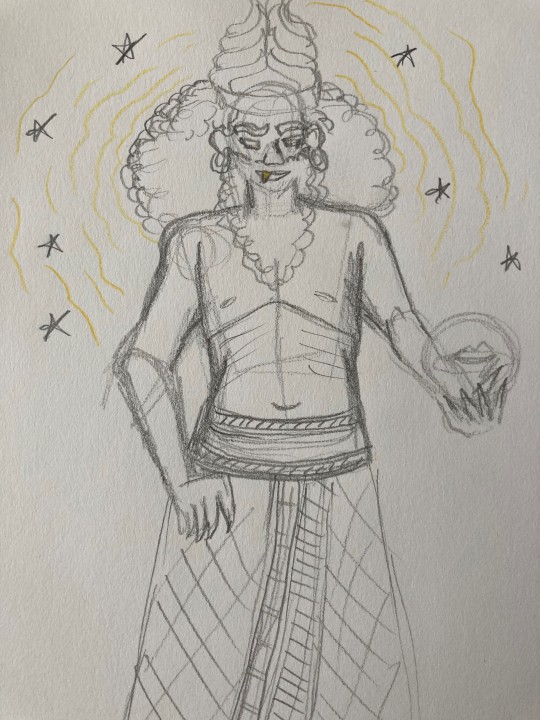

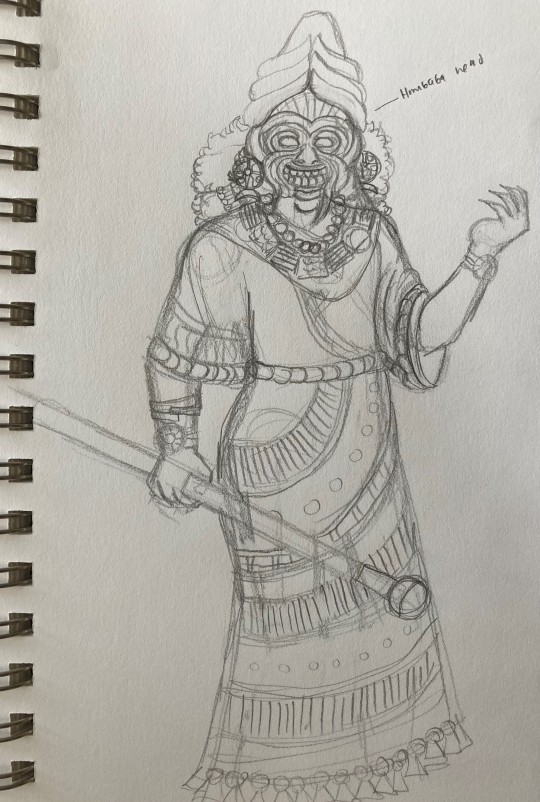
I like the idea of his body being luminous (like a star) since his attested children the Sebitti are anthropomorphized versions of the Pleiades, and him glowing green/commanding green fire.
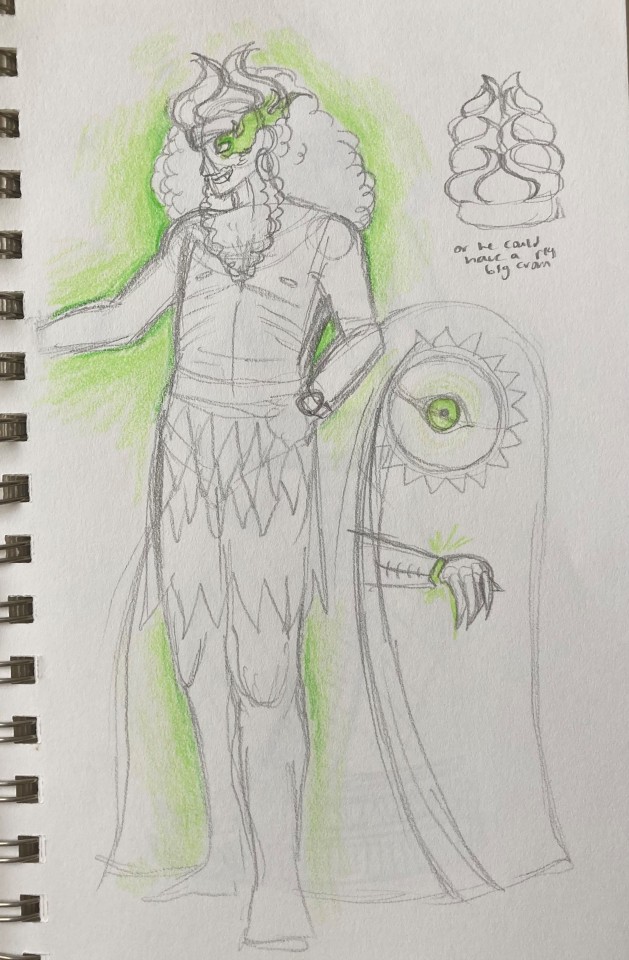
Enmesharra as Horrifying Flayed Man
A while ago me and a couple friends payed a Dungeons and Dragons game set in and around Babylon where Enmesharra was the main antagonist, out for revenge after the gods put him and his sons to death. His backstory taken mostly from the myth Enmesharra's Defeat where the god is captured, held in prison by Nergal, and is taken to Marduk's palace and deprived of his "splendor" which is then given to Shamash. Him and his sons are executed in the myth, but I went off the cuff a bit - after his execution by Marduk which in my version involved him being burned and flayed, he (unfortunately) survived, and his followers built him a suit made from gold, leather, and tamarisk wood that allowed him to live on.
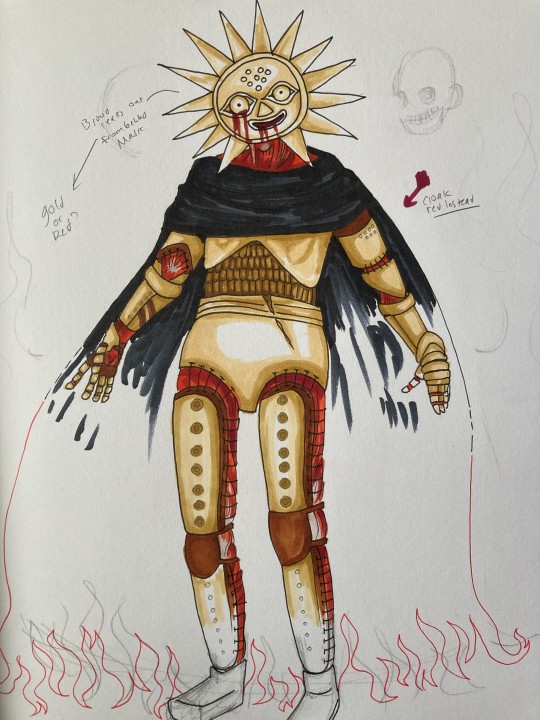
Cannot decide if I want gods to have "Gold blood" or bleed red like humans.
He wears a mask similar to the "Babylonian Cyclops" plaque, which was theorized as a possible depiction of him, though I favor that it instead depicts some other monster. Nonetheless I am into the idea wearing a mask resembling this creature.

(The god in this is sometimes identified as Shamash, but is probably Nergal)
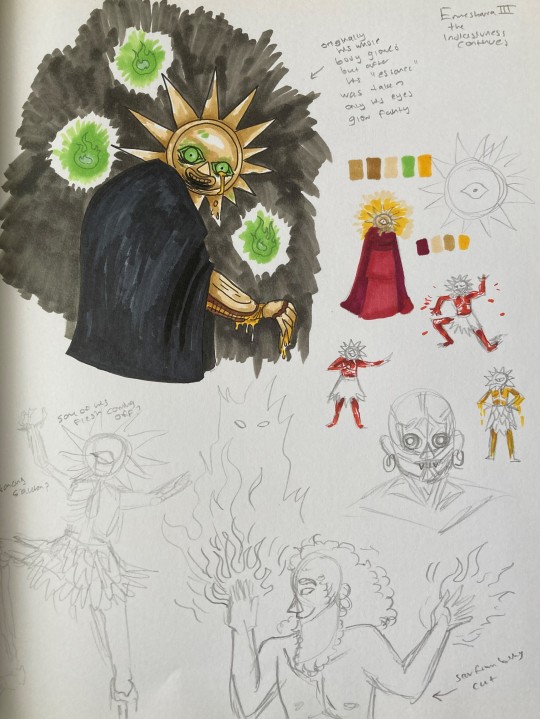
Sometimes he wears red, sometimes black, I just can't pick one! I don't get replies very often, but I would like to know which out of these people like the most! I'm super indecisive on his design and I want to make that piece.
18 notes
·
View notes
Text
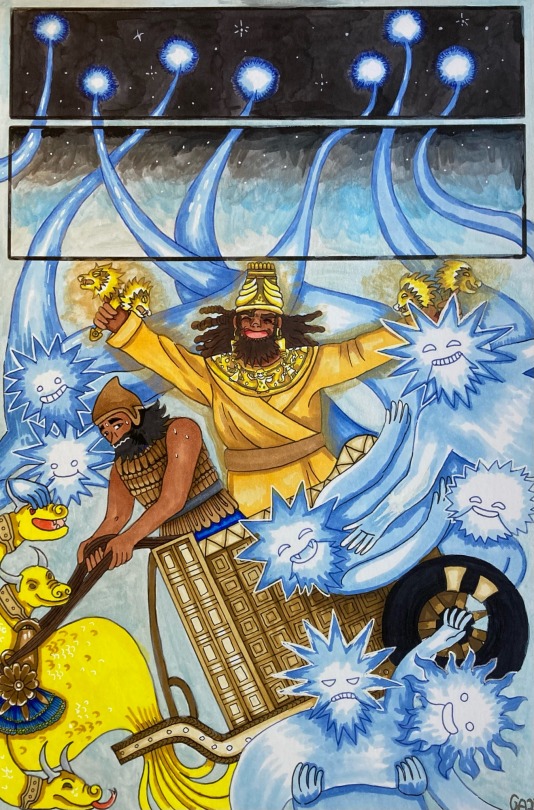
Nergal & Ishum In the chariot of Tiglathpileser the Third
A friend of mine loaned me some copics so I was finally able to color this!
The seven Sebitti here around the chariot are more “anthropomorphized stars” than humanoid, which is one of the many ways they were interpreted. (Also as war gods, sons of Enmesharra, foreign gods, etc..)
110 notes
·
View notes
Note
Hi! I hope this is okay to ask. I am trying to research the Pleiades and Hyades in Mesopotamian-influenced myths and cultures, but keep running into sources that seem… less than reliable. I honestly trust your knowledge more than most academic papers. Would you be okay with talking a little about them, and/or recommending sources to which I could turn? I’m sorry that’s so broad. I appreciate your time and wisdom!
Let's start with the more straightforward half of the question. Hyades played no notable role in Mesopotamian astronomy and astrology, let alone mythology. A constellation named "the jaw of the bull" consisted of roughly the same set of stars plus α Tauri, and a commentary links it with Girra, but take into account esoteric works like that often made random connections which had 0 to do with religious practice and there is, to my knowledge, precisely 0 evidence for worship of the Hyades as symbol of a deity, let alone Girra. This article summarizes the paragraph, the pdf is searchable.
As for the Pleiades: it seems they were simply known as "the stars" (MUL.MUL, 𒀯𒀯; mul - 𒀯 - means "star" and also functioned as a determinative for astral body names) or alternatively as Zappu (a term referring to bristle or a bull’s mane, apparently), and it is safe to assume that from the Mesopotamian pov there were only seven of them (source). It has been argued that a symbol of seven dots in a line known from cylinder seals might correspond to them, which would imply some degree of relevance from early periods already, but note the symbol might mean different things in different times and areas, and as noted by Ulla Koch-Westenholz in her monograph (p. 39), most of the clear evidence comes only from Assyria.
Pleiades were first and foremost associated with ill omens, especially with these signifying the coming of war and disease (pp. 133-134). The Sebitti (quite literally s/t like "the divine seven", "Heptad") functioned as a divine representation of them (p. 118); there is quite a lot of these deities and in addition to a very detailed Reallexikon entry entire studies have been dedicated to them alone (ex. this one; a quick ctrl+f reveals 400+ mentions of Pleiades, have fun) so it is difficult to summarize everything here. Long story short, their astral connection is firm and well attested, they were warlike, they appear alongside Nergal/Erra as members of his entourage (ex. in Epic of Erra), their father was seemingly the primordial god Enmesharra, whose grand cosmic role is that of Enlil's paternal uncle (sic) and their sister was Narunde/Narundi/Narudde/I give up, a goddess borrowed from Elam who for some reason survived in Mesopotamia longer than at home; I do not think she corresponded to any astral body.
If you are looking for a basic overview of Mesopotamian astral ventures, Koch-Westenholz's aforementioned monograph, while focused on divination, is overall still a good start (I have not seen anyone else suggest Ishara’s star symbol, the “scorpion star”, corresponds to Venus, though). This author herself also recommended this article and a few others in an afterword added later. It is vital to take into account that for the most part this was not all that major as a component of religion before the first millennium BCE and outside of a the firmly astral deities (Inanna, Nanna, Utu, Ninsianna, the Sebitti, possibly Shulpae etc) there's no real reason to think the star associations necessarily had much to do with the average person, or even priests, conceptualized a deity.
You will get little unique material of the sort you are looking from the rest "cuneiform world." While Mesopotamian astral treatises had a very wide circulation and reached far to the west, I am not aware of any unique references to Pleiades from Ugarit (in fact, the sun and the moon seem to be the only astral bodies of some bigger importance there), Emar (save for a god list presenting Sebitti as equivalents of Hurrian Pairra), Qatna or Alalakh in the west or Nuzi and Susa in the east. Koch-Westenholz makes the argument that a divine representation of the Pleiades was present in the Hititte state pantheon (p. 46), but the most recent take on the matter I could find speaks of "alleged" rather than proved presence of these stars in Hittite religion. The matter is discussed in more detail here, here and in the Pairra article (with skepticism aimed at the Pleiades link or even the number of the deities involved).
25 notes
·
View notes
Photo

First post about the Inanna story in a while, introducing a key character in the first arc, Ninimma, Enlil’s court archivist. Since there are no identified depictions of her, and she has no distinct iconography beyond presumably beind a scribe, I wanted to check if combinging the huge eyes of the Tell Asmar votive figures with the "iconic" Early Dynastic monobrow results in something passably glasses-like. As for everything else, see under the cut.
In terms of personality, I want to stick pretty close to the quirks of the two known Ninimma hymns: over the top "academic" style, rare synonyms, in one case also seemingly purposely avoiding names of other deities in favor of descriptive phases - i think it makes for a reasonably coherent personality.
irl Ninimma was a popular deity among scribes (at least in Nippur - in one sample set of texts there are more names invoking her than Ninlil which is remarkable seeing how Ninlil was, you know, essentially the city goddess via marriage); she was herself some sort of scribe in the employ of Enlil - i've seen her title translated as terms like "scholar" or "librarian" - so i will stick to that too; my version is specifically going to be in charge of organizing the data pertaining to Enlil's ancestors. She regularly gets fed up and reorganizes it, as a nod to the notably inconsistent character of the real lists of these deities; irl only the first pair was locked, in my version obviously a bit more needs to be during to Enmesharra being a central lore figure, but more on that on another day; as a side note, Ninimma does NOT respect Ninisina, who believes there is some central model of divine evolution, and asserts gods evolved from lahmus, as evident in comparable inner ear structure and other such details. This is, obviously, the product of a deeply unserious discipline (from Ninimma's pov, at least). She does not think "but lahmus are still around" is that good of an argument, though. Yeah, this is a creationism joke.
The idea to connect her with divine ancestors is based on the theory that her name and Nammu's are cognates; I thought it would be funny. Note Ninimma is actually MUCH better attested than Nammu though.
In-universe Ninimma's origin is not particularly well known (so, just like irl). Nisaba just brought her to Enlil's court some day and everyone went with it (the connection is based on both having similar profile and appearing in god lists together; I didn't find any evidence for actual biological relation between them hence making her a protegee of some sort only). Whether her earlier brief career as one of the Šassūrātu predated her "discovery" by Nisaba or if she initially dropped her off there is a matter of occasional gossip among other courtiers but since Ninimma is not a thrilling or polarizing figure it is not discussed all that often.
Due to her vital importance from ideological point of view, Ninimma occupies one of the top spots among Enlil's underlings, and for all intents and purposes is treated as a family member (this is a nod to an obscure real text too), similarly to Manungal. However, while other of the lead underlings have multiple lesser ones under them, Ninimma is a solo act. She did develop a sense of camaraderie with some of the other courtiers, though.
In the actual story Ninimma will appear in the very first arc, as the section of Enlil's temple complex under her care is precisely the place Inanna wants to steal something from to Make A Point after a sore breakup with one of Enlil's children.
#rider of the clouds#for now using the same tag for all story ideas but i will change that eventually
12 notes
·
View notes
Note
What were the roles and genealogy of Ninhursag?
Placed under the cut due to length. If not stated otherwise, the source is the book Goddesses in Context, linked pretty early on.
Starting with genealogy, because it's more straightforward. According to Manfred Krebernik, no explicit references to Ninhursag's parentage are known, and implicit evidence is largely provided just by statements about her being a sister of Enlil (source). Note that in Enlil and Sud, Enlil's sister is instead named Aruru, who was initially a separate goddess, associated only with vegetation. Since as far as I can tell no explicit references to Ninhursag being Enlil’s sister occur in most texts focused on Enlil’s own genealogy, I can’t really tell you if it means all the Lugaldukugas and Ninkis and Enmesharras commonly populating his family tree were also believed to function as Ninhursag’s ancestors. Or ancestors of his other sisters like Ningirima, for that matter. I don’t think I’ve ever seen a direct reference to Anu being her father. Krebernik also speculates that she might have been treated as a cosmogonic deity (ie. involved in the early history of the universe) which, I presume, would imply no real genealogy.
As a side note, Ninhursag’s relation with Enlil actually varies between sources, and in Lagash they were envisioned as a couple, though fwiw it was not really considered significant in Nippur (Enlilville) or Kesh (Ninhursagville) from what I’ve been able to gather, and Ninhursag appears there alongside Shulpa’e, her stock husband, instead. Rather elusive deity, but you can read a bit about him here.
Ninhursag's primary role is creation/birth; note that while commonly employed, the term "mother goddess" is not fully adequate because Mesopotamian goddesses who performed such a function only made living beings, they did not nurture them, and the process could be compared to crafting statues at times (also note craftsman deities like Ninmug appear in the entourage of “birth goddesses”). As always, I direct everyone to Goddesses in Context for relevant info. Note that Westenholz points out that it is possible that Ninhursag was initially responsible for nurturing rather than birth, though, since kings of Lagash and Kish seemed to present her as such.
Ninhursag’s other role is self-explanatory - her name means “mistress of the mountain ranges.” This might be tied to her possible cosmogonic role. Via merges with other similar goddesses she also came to be viewed as the creator in mankind, as in a Neo-Babylonian inscription, where she is “ exalted ruler, creatress of mankind, queen of the great mountains.”
A role Ninhursag at first seemingly did NOT hold was that of a city goddess of a major settlement - most of her cult centers were, according to Westenholz, “suburban towns and villages.” After the Sargonic period, she also “moved in” with her son Ashgi in Adab and, to put it colloquially, kicked him out of his city god position there. She also eventually displaced/absorbed the tutelary goddess of Kesh, Nintur. Some info on her early cult centers can be found here but it’s all in german.
Ninhursag also held the generic position of one of the “great gods,” though the common claim she was universally the #4 of the pantheon is not entirely correct. Also - note that when she is referred as “mother” this might be reference to this position of authority rather than to any association with children. As summed up in Goddesses in Context linked above: “nineteenth-century gender ideology that could not imagine motherhood other than in terms of an immanent feminine quality rooted in biology, contrasting with a universal, transcendental masculine divinity.”
13 notes
·
View notes
Text

Sarpanit & Marduk, Ashurbanipal Banquet
I’m not the biggest Marduk fan (he’s a bit of a state mandated god) but I enjoy my design of him, and I think this is the best drawing of Sarpanit I’ve done so far. I drew them both for inktober, but to recap Marduk was the patron god of Babylon, protagonist of Enuma Elish, and Sarpanit Is his consort, a goddess of birth.
The picture here is based off of a famous relief from the palace of Ashurbanipal, the “banquet scene”. It was fun to draw all the various furniture!
Still working on that Enmesharra drawing, I remain Indecisive on the colors. :/
12 notes
·
View notes
Photo
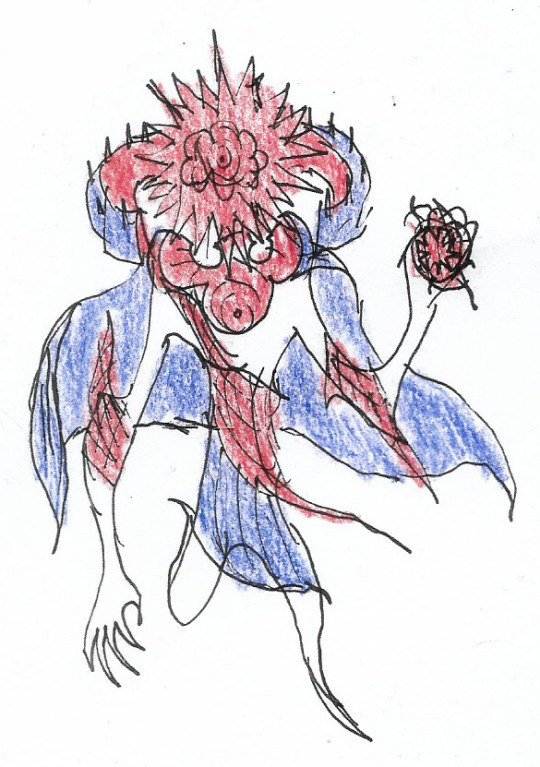
Enmesharra, a malevolent primordial god of Mesopotamian mythology.
He was in possession of all divine authority over the cosmos, until he was dethroned by his nephew Enlil.
6 notes
·
View notes
Text
Oh yeah I fixed more Wikipedia articles, the ones listed below are trustworthy now. For now I am taking a hiatus from that site for a few weeks, but further plans are under the cut.
Pinikir (this one is just an expansion, I already worked on it before)
Kiririsha (who has nothing to do with Pinikir contrary to what wikipedia claimed earlier and... what every other laguage version still claims. Rip, Pinikir)
Ninsianna (changes gender based on grammatical gender of corresponding celestial body, or something along these lines)
Ninazu (contrary to the meaning of his name - “lord healer” - an underworld god, not a divine doctor)
Mammitum (Nergal’s wife. Not Ereshkigal. Also not the divine midwife or the goat-headed demon. Might be the goddess of frost and the like)
Nergal (Nergal)
Nisaba (writing, counting, and all that stuff. Enlil’s mother in law. Imagine if Zeus had a mother in law who doubles as his accountant, that’s roughly how she functions. I do not vouch for the unicode paragraph because I did not write it!)
Own old articles to expand/redo according to my current standards:
Ishara
Tishpak
Allani
Humban
Inshushinak
Nanaya
Shala/Shalash -> needs to be split into two
Enmesharra
Short, needs work:
Wer
Manungal
Ishtaran
Papsukkal
Awful, needs work:
Enlil
Ninlil
Nanna
Ningal
Missing articles to create:
Ishmekarab
Tashmishu
Takiti
Shuwala
Nabarbi
Ugur
Barama
Anunitu
37 notes
·
View notes
Text
I also kind of hate that due to the fact that 1950s-1970s assyriologists like Jacbosen or Kramer often wanted to form a single coherent system out of a handful of early finds, which obviously do not form a coherent “setting” because mythology is not a centrally planned multimedia franchise, the VERY common lists of Enlil’s ancestors (up to 21 generations) are obscure and the view that Anu was his father is treated as the default in popular works
Anu is, at best, one of four options (the other 3 being the ancestor list, Lugaldukuga and Enmesharra, with the latter two beinf offshots of that tradition anyway)
13 notes
·
View notes